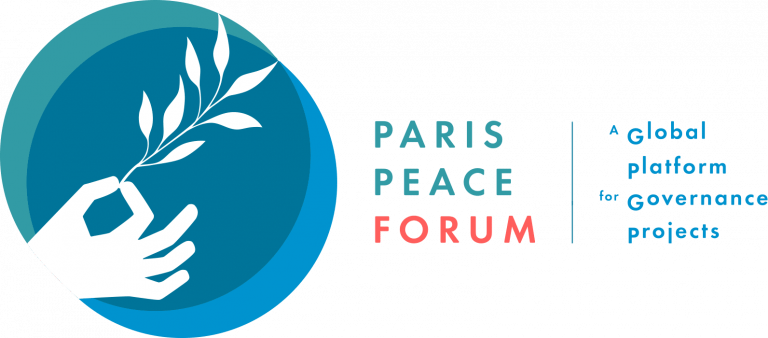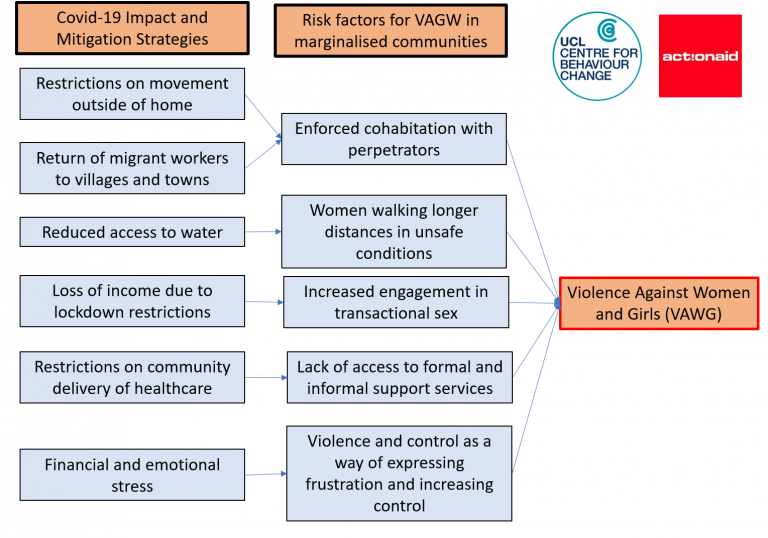Blog post: CBC and Action Aid Ireland collaborate to reduce violence against women and girls
12 November 2021

CBC’s partnership with ActionAid Ireland receives recognition of excellence from the Paris Peace Forum
Paul Chadwick, Savannah Simons, Triona Pender
In November 2021 the partnership between ActionAid Ireland (AAIre) and the UCL Centre for Behaviour Change (CBC) was recognised as a project of excellence by the Paris Peace Forum. Triona Pender (AAIre Head of Programmes) and Dr. Paul Chadwick (CBC Deputy Director) were invited, as one handful of projects, to present their work at the annual conference of the Forum. The Paris Peace Forum was initiated by French President Emmanuel Macron to revive collective governance, international cooperation, norms and institutions for pressing global issues. Its annual conference recognises projects of excellence globally. One of the key themes of the 2021 conference is Achieving Equality Between Women and Men.
The presentation focussed on adapting and applying a behaviour change model to safeguarding women against increased risk of gender-based violence (GBV) during the COVID-19 pandemic and is summarised below.
The COVID-19 pandemic has had unprecedented impact on the way people live their lives. As well as the obvious and devastating effects on health there have been other less visible, but equally important impacts. One of these has been the sharp rise in violence against women and girls – a secondary pandemic of gender-based violence affecting women in all communities, but particularly those in marginalised communities in low- and middle-income countries.
The UCL Centre for Behaviour Change and ActionAid Ireland have been developing an approach to reducing gender-based violence and increasing economic independence of women in a Women’s Rights Programme operational in Ethiopia, Kenya and Nepal since 2017. The approach is based on the simple but powerful COM-B model which outlines the three necessary conditions for behaviour; capability, opportunity and motivation. The approach integrates the Behaviour Change Wheel framework (Michie et al, 2014) within an adaptive model to create an innovative approach to programme implementation. It supports development practitioners to work in the heart of communities, developing a deep understanding of the root causes of violence, and working collaboratively with community members to develop co-ordinated interventions to bring about transformative change. The approach is described in detail here.
The onset of COVID-19 and the mitigation strategies used to prevent its spread fundamentally shifted many aspects of the social, economic and physical aspect of women’s lives. Many of these changes increased women’s risk of experiencing gender-based violence. Figure One illustrates the pathways between COVID-19 impact and mitigation strategies and the factors increasing risk for male violence we observed in Ethiopia, Kenya, and Nepal.
Lockdowns and restrictions on movement compounded the severe poverty that exists in the marginalised communities where the programmes operate. Additionally, there was an influx of returned migrants who unaware of changes in norms and attitudes discouraging male violence that our programme had helped develop. This increased pressure on families who were already struggling to feed themselves or gain access to water and health services. Rural areas suffered additional loss of income and the stress of forced cohabitation all day increased the opportunity for and likelihood of violence.
In addition to this, lockdown-imposed restrictions on the delivery of community services led to reduced access to informal and formal support structures. This contributed to a breakdown of the responsible for reporting and managing cases of male violence. There were increases in coercive control over resources that might enable women to report and receive support (e.g. men controlling women’s access to phones) and increases in behaviour that exposed women to risk (e.g. walking long distances) due to collapses in infrastructure (e.g. access to water). The stresses of increased financial hardship and loss also created an emotional tinderbox in which men, responding to a sense of frustration and lack of control over their own lives, sought to reassert a sense of control through the abusive expression of power over women and children.
By the time COVID-19 arrived colleagues in Ethiopia, Kenya and Nepal had been using a behaviour change approach for some time. In terms of the COM-B model, COVID-19 and its mitigation strategies had primarily (but not exclusively) shifted the opportunities that increased the expression of gender-based violence in marginalised communities. Using this understanding, country teams were able to apply the Behaviour Change Wheel approach to develop and implement a series of tailored interventions addressing key influences on behaviours leading to male violence. These included:
- Increasing access to water and other basic necessities for life to reduce pressure and exposure to behaviours leading to risk
- Informing people about COVID-19 prevention via posters in local languages, which were found to be more effective than radio broadcasts
- Tackling the lack of support infrastructure by increasing women’s access through use of mobile technology (WhatsApp), enabling women to report cases of violence remotely. We provided additional gender-based violence focal points in villages to support this response
- Implementing a behaviourally-informed education intervention targeting the behaviours of young men to address the issue of cyber violence which was particularly affecting women in Nepal
- Interventions to adapt existing and create new livelihoods such as soap making, a commodity that was in high demand, to relieve financial pressure
- Putting pressure on duty bearers to proactively engage and prosecute instances of abuse when they become aware of them. The community used social media to share stories of inaction, which increased plied pressure to address the breakdown in the gender-based violence support and case reporting systems
- Encouraging men to role model behaviour and to maintain unpaid care work support behaviours
It is now well recognised that women have shouldered the greatest share of the burdens associated with the COVID-19 pandemic, and this is particularly so for marginalised women in low- and middle-income countries. Initiatives to curb one pandemic inadvertently created the conditions for a shadow pandemic of male violence to take hold and spread. The long-term implications of this are not yet known. However, the use of a behavioural approach allowed us to rapidly assess the impact of the developing situation and respond in ways that brought together the economic, health and rights-based elements of a response, whilst simultaneously promoting women’s participation and rights as equal citizens.
Had we used a more traditional approach, then many of these actions would not flow logically from a simple ‘know your rights’ methodology.
Figure one: The relationship between COVID-19 and violence against women and girls

For further information on this work please contact Paul Chadwick (p.chadwick@ucl.ac.uk, Twitter: @drpaulchadwick) or Triona Pender (Triona.pender@actionaid.org, Twitter: @triona_sarah).
 Close
Close

